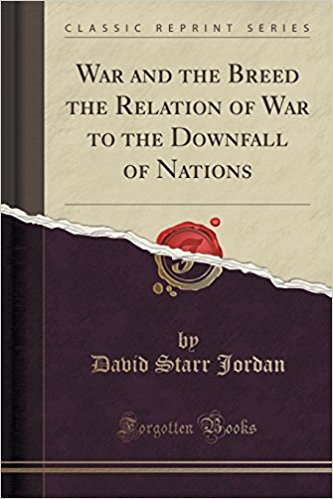Sacrificing the Best
Thomas Jackson, American Renaissance, December 1993
War and the Breed, David Starr Jordan, Beacon Press, 1915, (abridged reprint by Cliveden Press), 127 pp.
Today, the welfare state is the most powerful force working to lower the genetic level of the population. Any system that forces the responsible and hard working to support unlimited procreation by the incompetent can only drag down the average. In this little book, David Starr Jordan reminds us that war is even more ruthlessly dysgenic. The very best of a nation’s men are cut down in battle, often before they have had even a single child.

Jordan wrote this book in 1915, one year into the great, fratricidal struggle that desolated so much of Europe and set the stage for an even more terrible struggle. He saw the Great War as only the latest and most horrible of the butcheries that have retarded the evolution of the race. This contemporary and abridged reprint is illustrated with 28 full-page photographs and brief biographies of some of the young Britons who were needlessly sacrificed in that war. Their strong, honest faces are a silent reproach to governments that were willing to snuff them out without issue.
Jordan offers several reasons why war sends a nation’s best to their deaths. First, armies do not accept the feeble-minded, sickly, or deformed. Second, among those who serve in combat, it is the bravest, most intelligent men who make the best soldiers and who are therefore relied upon by commanders when combat is most desperate. Finally, until recently, all European nations had military traditions that drew their best and most patriotic sons to the colors.
Jordan makes the point that this has always been the case. Though he may press the point a little too far, he argues that it was war that brought down Greece and Rome by slaughtering their best men. The Greeks were not unmindful of the terrible genetic risks of war, and at one time took precautions against them. Every one of the Spartans who died in the defense against the Persians at Thermopylae was a volunteer, but no man who had not already had at least one son was left behind to guard the pass. Later, during the Peloponnesian Wars, hard-pressed Greeks could no longer hold their childless men in reserve.
Jordan notes that the burden of empire so decimated the Romans that whole tribes of aliens and even slaves were made into legionnaires. Horace, writing near the beginning of the Christian era, recorded the consequences:
Our grandfathers sired feeble children; their’s
Were weaker still — ourselves; and now our curse
Must be to breed even more degenerate heirs.
The British, too, have suffered both from the losses of war and from the great outpouring of adventurous men who sought their fortunes in the colonies. The exertions of empire and the costs of two world wars have changed the character of the British. Jordan quotes Havelock Ellis: “The reckless Englishmen, who boldly sailed out from their little island to fight the Spanish Armada, were long since exterminated; and an admirably prudent and cautious race has been left alive.”
Under Napoleon, France too reaped a gruesome harvest of Europe’s best men. In the emperor’s time, soldiers were chosen for their height, because tall men made a more fearsome impression on the battlefield. Jordan writes that the wars of the Republic and the First Empire notably diminished the stature of Frenchmen. The declining average height of a population can be measured; the other qualities that were lost — bravery, dash, and intelligence — cannot.
The losses that Napoleon inflicted on Europe come into perspective when compared with casualties during America’s own fratricidal war. At Gettysburg, our bloodiest battle, 163,00 men were engaged and 37,000 killed or wounded. At Napoleon’s defeat in 1813 at the Battle of Leipzig, 440,000 were engaged and 92,000 killed or wounded. However, the greatest loss France suffered under Napoleon was during the Grand Army’s retreat from Moscow in 1812. Of the 400,000 men who had set out to discipline Russia, only 20,000 returned. It is testimony to the martial vanity of man that Napoleon, who once said that “a boy will stop a bullet as well as a man,” should still be a hero to the French.
Of course, tanks and machine guns soon made modern war even more murderous. The Battle of the Somme, which dragged on for four months in 1916, claimed over 600,000 British and French casualties, and an unknown but roughly equal number of German casualties.
It is fortunate that war does not kill off the best of the women along with the men — at least it did not before the era of civilian bombing. However, as Jordan explains, war often so thins the ranks of the better men that the women they would have married may be unable to find husbands.
In today’s climate of enforced silence on genetic matters, it is instructive to note how unselfconsciously Jordan wrote about the dysgenic effects of war. At the time, he was chancellor of what became known as Stanford University, and his concerns about the genetic quality of the race were widely shared. He quotes many others — journalists, professors, and even poets — who issued the same warnings about the effects of war.
Neither Europe nor America has fought a major war since 1945, so an entire generation has been spared. Moreover, the technical means to wage mass war and the disappearance of the gentleman-soldier tradition mean that future conflicts may be more akin to indiscriminate massacres than to selective, dysgenic killing.
Today, welfare is a greater threat to the gene pool than warfare.















